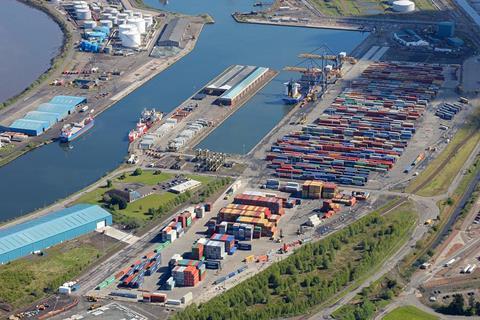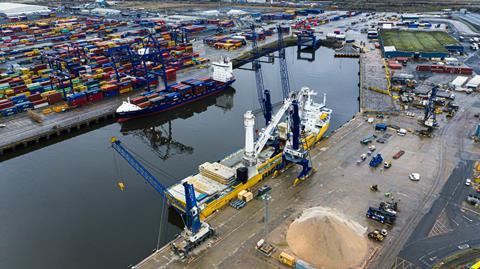UK-based port operators are committing to sustainability goals and investing in greener handling equipment.

The UK’s third-largest ports group, Forth Ports, has outlined its commitment and the actions it is taking to achieve a net-zero carbon operation by 2042. The company also outlined an interim target of achieving carbon neutral emissions (Scope 1 and 2) by 2032, while creating an infrastructure platform to help accelerate the UK’s path to a decarbonised economy.
To achieve this across the group’s eight ports, the team is overhauling and electrifying equipment and machinery, switching to low-carbon fuels, increasing onsite renewable energy generation, and promoting greener delivery alternatives such as rail and barge. This is complemented by significant investments in new port infrastructure to support the offshore wind revolution taking place in the North Sea.
All new warehouses, for instance, will have solar roof panels installed as standard, such as the recently built facility at the port of Grangemouth. A programme of rolling out new LED lighting is also under way to further reduce power use across all port estates.
For mobile equipment and its marine fleet, the strategy is to blend and utilise alternative fuels. Initially this involves the widespread use of sustainably sourced hydrogenated vegetable oil (HVO) and, as technology develops, other methods of low emission propulsion. An ongoing programme exists to introduce more fuel-efficient equipment and marine fleet across the asset base.
Forth Ports is also part of the Thames Freeport and Forth Green Freeport partnerships, which are seeking to accelerate the drive to net zero across the country.
Charles Hammond, group chief executive of Forth Ports, said: “We have already achieved a great deal in reducing our day-to-day emissions and enabling our customers to do the same. Our roadmap will aid the UK’s transition to a decarbonised economy.
“Large-scale market-ready port infrastructure is essential for the deployment of offshore wind. We have made significant progress in supporting the offshore wind sector through our initial GBP150 million (USD187.8 million) investment programme – a key plank to enable the transition to Net Zero – with plans to invest significantly more as this market develops, including the infrastructure required for floating offshore wind as installations go into ever deeper seas.”
PD Ports, meanwhile, has invested in two electric cranes at Tees Dock. Representing an GBP8.6 million (USD10.8 million) investment, the Liebherr cranes feature handling capacities from 100 to 140 tonnes, are electric-hydraulic powered and offer a more environmentally conscious and efficient solution for loading and discharging a range of bulk commodities.

Frans Calje, ceo at PD Ports, said: “We recognise our responsibility to ourselves, our communities and our customers to reduce environmental impact which is why we have set such ambitious decarbonisation targets – targets that we are well on track to exceed.”
A range of initiatives – including the procurement of electric vehicles, conversion of existing equipment and the introduction of low and zero emission energy sources – PD Ports’ CO2 emissions are already back to levels last seen in 2000.
The company is now also on track to be carbon neutral by 2027.
















